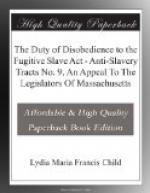In the name of oppressed humanity, of violated religion, of desecrated law, of tarnished honor, of our own freedom endangered, of the moral sense of our people degraded by these evil influences, I respectfully, but most urgently, entreat you to annul this infamous enactment, so far as the jurisdiction of Massachusetts extends. Our old Commonwealth has been first and foremost in many good works; let her lead in this also. And deem it not presumptuous, if I ask it likewise for my own sake. I am a humble member of the community; but I am deeply interested in the welfare and reputation of my native State, and that gives me some claim to be heard. I am growing old; and on this great question of equal rights I have toiled for years, sometimes with a heart sickened by “hope deferred.” I beseech you to let me die on Free Soil! Grant me the satisfaction of saying, ere I go hence—
“Slaves cannot breathe
among us. If their lungs
Receive our air,
that moment they are free!
They touch our
country, and their shackles fall!”
If you cannot be induced to reform this great wickedness, for the sake of outraged justice and humanity, then do it for the honor of the State, for the political welfare of our own people, for the moral character of our posterity. For, as sure as there is a Righteous Ruler in the heavens, if you continue to be accomplices in violence and fraud, God will not “save the Commonwealth of Massachusetts.”
L. MARIA CHILD.
APPEAL TO THE CONSTITUTIONALITY OF THE FUGITIVE SLAVE ACT.
The Hon. Robert Rantoul, Hon. Horace Mann, Hon. Charles Sumner, and other able men, have argued against the Constitutionality of the Fugitive Slave Bill, proving it to be not only contrary to the spirit and meaning of the Constitution, but also to be unauthorized by the letter of that document. That this nefarious Bill is contrary to the spirit and intention of the Constitution is shown by the published opinions of those who framed it; by the debates at the time of its adoption; and by its Preamble, which sets forth that it was ordained to “establish justice, ensure domestic tranquillity, promote the general welfare, and secure the blessings of liberty.” The arguments adduced to prove that this bill is unauthorized by the letter of the Constitution, I will endeavor to compress into a few words.
Article 10 of the Amendments to the Constitution expressly provides that
“Powers not
delegated to the United States by the
Constitution, nor
prohibited by it to the States, are
reserved to the States
respectively, or to the people.”
Article 4 of the Constitution contains four compacts. The first is:
“Full faith and credit shall be given in each of the States to the public acts, records, and judicial proceedings of every other State. And the Congress may, by general laws, prescribe the manner in which such acts, records and proceedings shall be proved, and the effect thereof.”
Here, power is expressly delegated by the Constitution to the United States.




